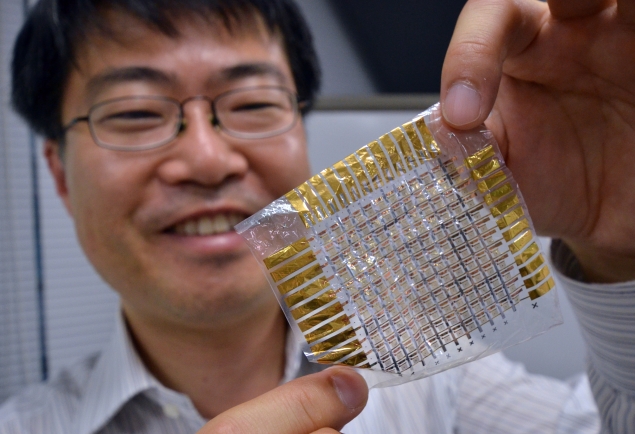- Home
- Others
- Others News
- A flexible electrical circuit one fifth the thickness of food wrap
A flexible electrical circuit one-fifth the thickness of food wrap

The team at the University of Tokyo said the device, embedded in an ultra-thin film, is unique because it works even after it has been crumpled into a ball or stretched.
Researchers unveiling the circuit said it could be used to monitor all sorts of physical data, such as body temperature and blood pressure, as well as electronic pulses from muscles or the heart.
For people who can only move their tongue, the sheet might be placed on the roof of the mouth and serve as a touch pad to operate a communications device, team members said.
"This can be attached to all sorts of surfaces and does not limit the movement of the person wearing it," said professor Takao Someya of his research, which was published in the journal Nature on Wednesday.
Healthcare sensors often use silicon and other relatively rigid materials that can cause their users some discomfort.
The new flexible circuits should reduce or even eliminate such stress, he said.
Super-thin sensors could improve the lives of people who use artificial arms and legs, the research claims.
Wrapped around arms or other body parts, they would pick up nerve signals which the wearer's brain sends to the muscles when attempting to move, and pass the impulses to the limbs.
Their flexibility means that people could put on more sensors that would be able to pick up biosignals at a far greater number of places, resulting in smoother, improved movement of artificial limbs, researchers said.
The circuit could also be used as a shock-proof sensor for athletes, monitoring the body temperature and heartbeat during vigorous exercise.
The circuit is just two micrometres thick food wrap used in kitchens is typically 10 micrometres and weighs only three grams (0.1 ounce) per square metre, Someya said.
The product is so thin and light that, when dropped in the air, it falls while gently rolling and rocking, much slower than a bird's feather.
Its creation became possible after the team succeeded in creating a high-quality, super-thin insulating layer, Someya said.
Even in a salty solution, like those found inside the human body, the device worked well for more than two weeks, raising the possibility that it could be placed inside human bodies for data collection in the future.
Someya said more research needed to be done before that could happen.
For example, while the film is nearly imperceptible, its effects on the skin with which it is in contact are not fully known and it is possible that rashes could develop.
Making a reliable power source that is small enough to run the device is also a challenge.
For the latest tech news and reviews, follow Gadgets 360 on X, Facebook, WhatsApp, Threads and Google News. For the latest videos on gadgets and tech, subscribe to our YouTube channel. If you want to know everything about top influencers, follow our in-house Who'sThat360 on Instagram and YouTube.
- Galaxy S24 Series
- MWC 2024
- Apple Vision Pro
- Oneplus 12
- iPhone 14
- Apple iPhone 15
- OnePlus Nord CE 3 Lite 5G
- iPhone 13
- Xiaomi 14 Pro
- Oppo Find N3
- Tecno Spark Go (2023)
- Realme V30
- Best Phones Under 25000
- Samsung Galaxy S24 Series
- Cryptocurrency
- iQoo 12
- Samsung Galaxy S24 Ultra
- Giottus
- Samsung Galaxy Z Flip 5
- Apple 'Scary Fast'
- Housefull 5
- GoPro Hero 12 Black Review
- Invincible Season 2
- JioGlass
- HD Ready TV
- Laptop Under 50000
- Smartwatch Under 10000
- Latest Mobile Phones
- Compare Phones
- Vivo V30e
- Itel Super Guru 4G
- Huawei Pura 70 Pro+
- Huawei Pura 70 Ultra
- Tecno Camon 30 Premier 5G
- Motorola Edge 50 Fusion
- Oppo A1i
- Oppo A1s
- Asus ZenBook Duo 2024 (UX8406)
- Dell Inspiron 14 Plus
- Realme Pad 2 Wi-Fi
- Redmi Pad Pro
- Cult Shock X
- Fire-Boltt Oracle
- Samsung Samsung Neo QLED 8K Smart TV QN800D
- Samsung Neo QLED 4K Smart TV (QN90D)
- Sony PlayStation 5 Slim Digital Edition
- Sony PlayStation 5 Slim
- Electrolux 1.5 Ton 3 Star Inverter Split AC (ESV183C1AA)
- Electrolux 1.8 Ton 3 Star Inverter Split AC (ESV223C2CA)












